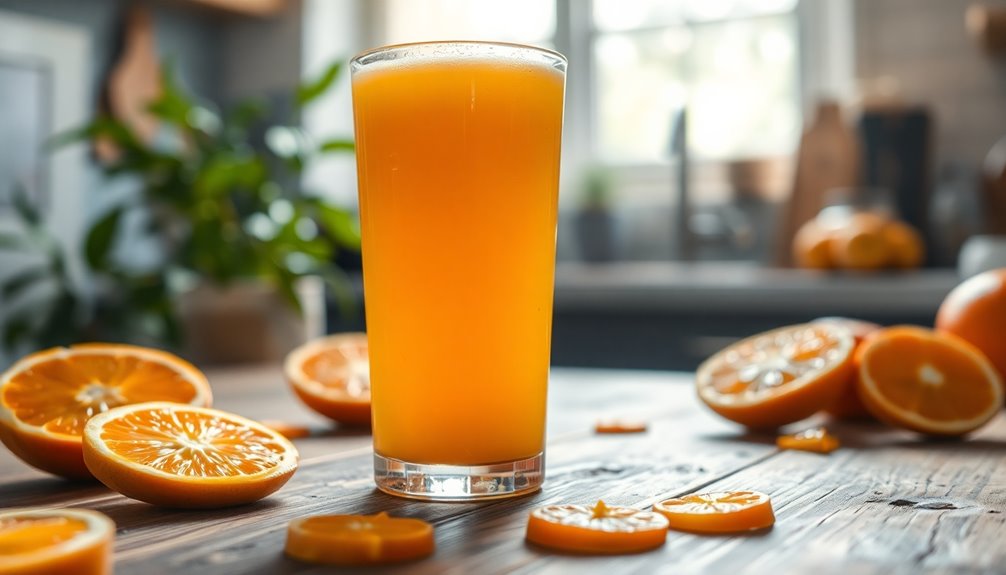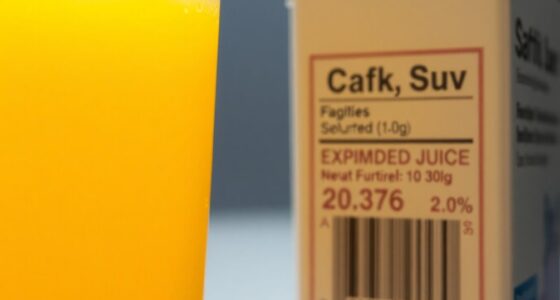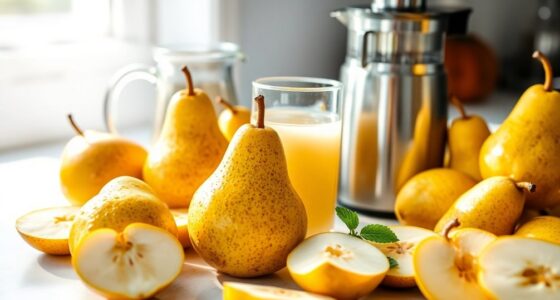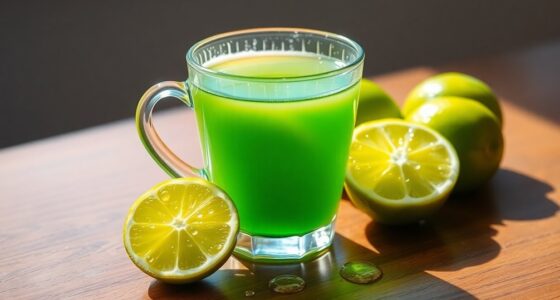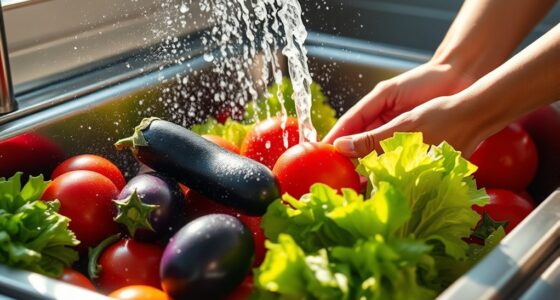Fresh fruit juice typically lasts between 24 to 72 hours in the refrigerator. For the best taste and nutritional benefits, consume it within the first 24 hours. If you use a cold-pressed juicer, your juice can stay fresh for about 3 to 5 days. However, juices made with a centrifugal juicer are best enjoyed within 24 hours due to faster oxidation. Want to know more about storage methods and tips for extending juice longevity?
Key Takeaways
- Fresh fruit juice typically lasts 24 to 72 hours in the refrigerator, with the best taste within the first 24 hours.
- Cold-pressed juice can last about 3 to 5 days when stored correctly, retaining more nutrients than other methods.
- Juices made with centrifugal juicers have a shelf life of up to 24 hours due to quicker oxidation.
- Freezing juice extends its shelf life to about six months, but optimal taste is within 2 to 3 months after freezing.
- Use airtight glass containers and store at 35-40°F (1.6-4.4°C) to maximize freshness and longevity.

Have you ever wondered how long fresh fruit juice really lasts? You're not alone in this curiosity, especially when you put in the effort to create a delicious and nutritious juice blend. The truth is, the longevity of your fresh juice largely depends on how you store it and the type of juice you've made. Generally, fresh fruit juice can last anywhere from 24 to 72 hours in the refrigerator if you store it properly. However, for the best taste and nutritional benefits, aim to enjoy it within the first 24 hours after juicing.
If you've opted for cold-pressed juice, you're in luck! This method of juicing involves pressing fruits and vegetables to extract the juice without introducing heat, which helps preserve the nutrients. Cold-pressed juice typically has a shelf life of about 3 to 5 days when stored correctly.
On the other hand, juices made with centrifugal juicers don't last as long. They usually have a shelf life of up to 24 hours due to the way they introduce air into the juice during the extraction process, leading to quicker oxidation.
To maximize the freshness of your juice, you should consider using airtight containers. Glass containers work best, and filling them to the brim minimizes air exposure, reducing the oxidation process that can make your juice spoil faster.
Store your juice at temperatures between 35-40°F (1.6-4.4°C) to maintain its quality. You might also want to add lemon juice to your fresh juice. The acidity in lemon juice acts as a natural preservative, helping to delay oxidation and extend the freshness of your juice.
If you find that you can't drink all your juice within a few days, freezing juice is another option. Freezing juice can extend its shelf life to about six months. However, for the best taste and nutrients, it's ideal to consume it within 2 to 3 months after freezing.
Just remember to leave some space in your container, as liquids expand when frozen.
Frequently Asked Questions
How Long Can I Store Juice After Juicing?
After juicing, you can store your juice for a limited time.
If you properly refrigerate it, freshly squeezed juice typically stays fresh for about 24 to 72 hours.
Cold-pressed juice may last up to 5 days, depending on storage.
For longer storage, consider freezing it, which can extend its shelf life to around 6 months.
Just remember, the best taste and nutrition are within the first couple of days.
Can I Drink 5 Day Old Fresh Juice?
You might wonder if you can drink 5-day-old fresh juice, but the answer isn't simple.
While it might still look okay, it could harbor harmful bacteria. If it smells off, tastes sour, or shows discoloration, toss it.
Fresh juice offers the best health benefits within 72 hours, so savor it sooner rather than later.
Your body deserves fresh, nutritious juice, not something that could compromise your health.
Choose wisely and enjoy!
How Long Does Juice Last in Mason Jars?
When you store juice in mason jars, it can last between 3 to 5 days in the fridge if sealed properly.
Make sure you use airtight jars to limit oxygen exposure, which keeps your juice fresher longer. Filling the jars to the brim reduces air space, further slowing oxidation.
Keep the temperature between 35-40°F, and consider adding a splash of lemon juice to extend its shelf life even more.
How to Know if Fresh Juice Is Bad?
To know if fresh juice is bad, check for a strong, putrid odor or unusual sour taste—these are clear signs of spoilage.
Look for a brown layer on top, which indicates oxidation, or a cloudy appearance with sediment. If the juice was once clear and now looks murky, it's time to toss it.
When you're uncertain, it's better to be safe and discard the juice to avoid any risk of foodborne illness.
Conclusion
In a nutshell, fresh fruit juice doesn’t last as long as you might hope. Typically, it stays fresh for about 24 to 72 hours in the fridge, depending on how you store it. To get the most bang for your buck, drink it soon after making it. Remember, it’s always better to sip on that liquid sunshine rather than let it go to waste. So, don’t let time slip through your fingers—enjoy that juice while it’s still fresh! If you’re looking for a longer-lasting alternative, consider canned fruit juices, which can often remain good for several months when stored properly. If you’re curious about specifics, you might ask yourself, ‘how long is canned pineapple juice good? ‘ Generally, it can last up to a year if unopened and stored in a cool, dark place. So, while fresh fruit juice is delightful and packed with nutrients, stocking up on canned options can provide you with convenience without compromising taste for extended periods.
Cindy thoroughly researches juicing trends, techniques, and recipes to provide readers with practical advice and inspiration. Her writing style is accessible, engaging, and designed to make complex concepts easy to understand. Cindy’s dedication to promoting the advantages of juicing shines through her work, empowering readers to make positive changes in their lives through the simple act of juicing.

